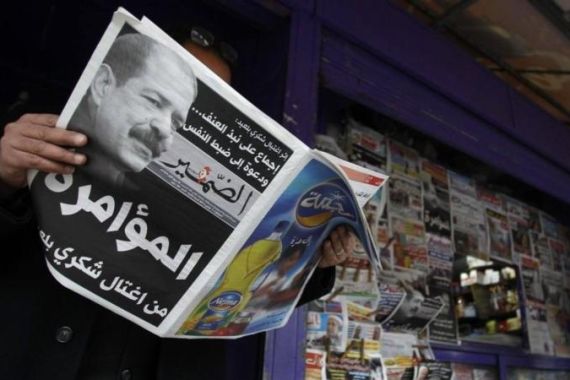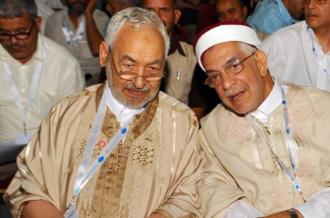Rifts threaten Tunisia’s governing party
Ennahdha’s failure to confront Salafists was major miscalculation, says movement’s vice-president.

Tunis, Tunisia – It was a startling moment, even for a country that has been through an uprising and more than two years of constant turmoil.
“I am ready to go to Guatemala or to Mars for Tunisia’s national interest,” said Rachid Ghannouchi, president of the Islamist Ennahdha Party in an interview on Nessma TV on Sunday evening.
He was explaining why he flew to Paris to meet with his political opponent, Beji Caid Essebsi, leader of the centrist-secularist Nidaa Tounes Party.
Ennahdha - and the opposition - did not live up to the aspirations of the revolution. They did not understand that it was time to change the rhetoric and the methods.
Essebsi, who had been a leading figure during the presidency of Habib Bourguiba, the very movement against which Ennahdha had emerged in opposition decades ago, sent Ghannouchi flowers when he was in hospital recovering from surgery, viewers learned.
The apparent rapprochement represents a détente in the political standoff that followed the assassination of Mohamed Brahimi, a leftist parliamentarian, on July 25.
Brahimi’s assassination, allegedly by Salafists, is the second this year, and led a broad alliance of opposition groups to call for the Ennahdha-led government to step down, and to call for the dissolution of the constituent assembly.
Last week, Ennahdha indicated that it would accept the dissolution of Prime Minister Ali Laarayedh’s government, and the formation of a technocrat government – under certain conditions.
“Ennahdha has accepted to start comprehensive national dialogue in the framework of [the] UGTT initiative,” Yusra Ghannouchi, Ennahdha spokesperson and daughter of the party’s president, told Al Jazeera.
And, after months of pressure from the opposition, Laarayedh on Tuesday officially declared the Salafist group Ansar al-Sharia as a terrorist group. That the party has shown such reluctance do so, however, has already caused the party considerable political damage.
Ennahdha’s Salafist miscalculation
Ghannouchi has become infamous in Tunisia for his alleged double-speak – saying one thing to Western media, and saying something very different to the party’s ultra-conservative base.
Since Ennahdha won the October 2011 election, its leadership has argued that tolerance towards Salafists groups would encourage the hard-liners to become more moderate.
The party’s critics, however, say that by showing so much indulgence towards Salafist groups, the door was left wide open for the type of violence that culminated in the September 2012 attack on the US embassy, political assassinations, and the emergence of armed groups in the Mount Chaambi region.
Even from within its own ranks, there are those who argue Ennahdha – which defines itself as “Islamist” – should have taken a firmer stance on Salafists much sooner, and that Ghannouchi’s sudden outreach to the political centre is too little, too late.
“Ennahdha didn’t make the right decision at the right time,” Abdelfattah Mourou, vice-president of Ennahdha, told Al Jazeera. “I’m not sure Ennahdha will be in the majority in the next election.”
Ennahdha didn't make the right decision at the right time... I'm not sure Ennahdha wil be in the majority in the next election.
Mourou, who cofounded the movement with Ghannouchi in 1981 but has been sidelined for his outspokenness and for being more progressive than many of the rest of the Ennahdha leadership, said Ghannouchi, and the secularist opposition, had waited for the political polarisation to get so bad.
He condemned what he called the party’s “laconic” position towards Salafists.
“Ennahdha – and the opposition – did not live up to the aspirations of the revolution. They did not understand that it was time to change the rhetoric and the methods,” Mourou said.
Mouru was one of the few dissident voices within Ennahdha to confront the Salafist movement, and is the only Ennahdha leader to have himself been the victim to the kind of physical assaults that have become so commonplace for many secular politicians.
‘Internal contradictions’
The influence of the hardline camp within Ennahdha was evident following the February 6 assassination of leftist politician and lawyer Chokri Belaid.
Then-Prime Minister Hamadi Jbeli, considered by many commentators as a moderate voice, had proposed a politically neutral technocrat government, but the hardline majority overruled him.
Mourou, who had backed Jbeli’s position, said by failing to take a more conciliatory stance at that time, Ennahdha were now in a much weaker position.
Alaya Allani, a historian and researcher on Islamism in the Maghreb at Manouba University in Tunis, said that Ennahdha was suffering from unresolved internal contradictions.
 |
| Rachid Ghannouchi, left, and Abdelfattah Mourou have had many differences, especially in their approach to Salafist groups [AFP] |
“Ennahdha is not a homogenous political entity, in terms of its orientations and discourse,” Allani said. “Ennahdha’s political discourse is inconsistent with its ideological discourse.”
While the movement itself was not based on Wahhabist principles, many of its base does adhere to a strongly literal reading of the Quran, and that encouraged Ennahdha to drift to the far right, he said.
There had been a clear strategy not to confront the Salafist “threat” head-on, and this succeeded in alienating a broad segment of Tunisian society against the movement, he argued.
“Many people reproach Ennahdha – that they wanted to use these Salafists for political ends,” said Allani.
Ennahdha will likely retain a solid base, he said, but would not repeat the kind of success it saw at the polls in 2011. He predicts the strains within the movement, which until now has shown a remarkable unity, could ultimately lead to it fracturing into smaller groups.
“We are talking about the end of political Islam as a governing force, but not as an ideological current,” he said. “I think that the liberal strain of political Islam is crucial for democracy, because I fear that if we leave the political landscape open to only [the secularists], we will not have democracy.”
Like Mourou, Allani said that Ennahdha’s recent attempts to distance itself from Salafism come too late.
Ali El Afi, an expert on religion at the ministry of religion, disagreed that Salafism had a strong influence on Ennahdha, arguing that it the party was rooted in the ideology of the Egyptian Muslim Brotherhood, with Tunisian influence, and was very distinct from any Saudi-inspired Wahhabist ideology.
“Ennahdha and its partners believe that it is wrong to keep up the practices of the police state, where people were arrested or targeted just because they were religious,” El Afi said.
“But Salafists need to realise that this is a state of law – and that the law will be applied against them if they break it,” he added, acknowledging that the absence of religious guidance or a firm stand by authorities from the state had led to a proliferation of groups, including of the jihadist-Salafist brand, since the uprising.
Ghannouchi might now be taking a more pragmatic approach towards the secularist opposition, but many members of his movement’s base are unlikely to accept this break with Ennahdha’s rhetoric of recent months.
“What people reproach is that [Ghannouchi] has divided society into believers and non-believers, without paying heed to the notion of citizenship,” Allani said.
This past week, Ennahdha – undoubtedly influenced by geopolitical changes in addition to growing domestic opposition – has shifted back onto the track of political pragmatism. The question is whether this political pragmatism comes too late, both for the movement and for Tunisian society as a whole.
Mourou is convinced the ultra-conservatives, for one, will be unforgiving.
“There will be violence from the Salafists,” he warned.
You can follow Yasmine Ryan on Twitter: @YasmineRyan